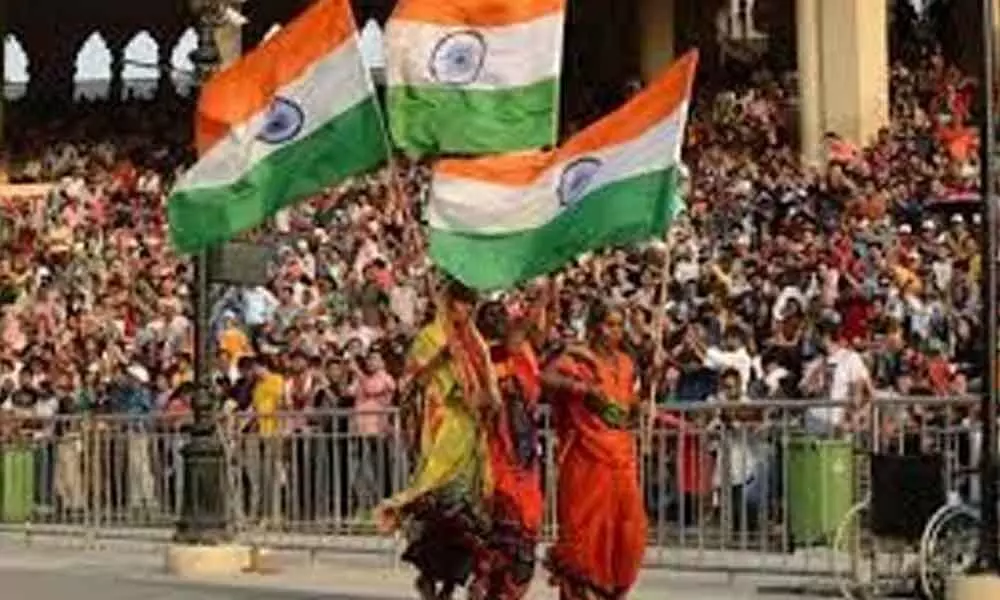Nationalism and democracy go together

Representational Image
India got its Independence some 75 years ago but it still looks like a 'nation in making,' judging from the in-terminate debate on 'the idea of India,' narratives built on the charges of 'majoritarianism' and abandonment of 'secularism' against the Narendra Modi government and perpetuation of anti-India lobbies that deprecated the very concept of patriotism.
India got its Independence some 75 years ago but it still looks like a 'nation in making,' judging from the in-terminate debate on 'the idea of India,' narratives built on the charges of 'majoritarianism' and abandonment of 'secularism' against the Narendra Modi government and perpetuation of anti-India lobbies that deprecated the very concept of patriotism.
All this is happening because of injection of 'party politics' in the interpretation of nationalism and the imparting of 'communal tint' in the practice of known democratic norms. This needs elaboration.
It was in October 1945 – after the Nazis had already surrendered in May, effectively ending the Second World War – when the United Nations was established with the express aim of not letting another war inflict the world, and encouraging sovereign nation states to exist in harmony with commitment to global peace.
It was universally accepted that democracy was the best form of internal governance for a nation – big or small – and that any international disputes would better be resolved through a UN mediation.
The Cold War soon setting in because of the tense ideological and military divide between the two rival Superpowers representing International Communism and Western Capitalism, did not take away from the merit of democracy over dictatorship as a system of governance.
Independent India began its innings on a note of complete democratic freedom by decreeing 'one man one vote' for election – abolishing at one stroke distinction of caste, community or gender among citizens – something that developed democracies of the West would achieve only after lengthy internal struggles.
It is a matter of concern that distorted politics came in the way of India, the largest democracy in the world, flourishing as a nation state – even after the lapse of several decades. Divisions of caste, community and region that India inherited as a legacy of the past were kept going by political parties for vested interests.
India's political parties providing the very substratum of democracy fell for the temptation of appealing to minority sentiments, catering to caste groupings and fomenting regional identity, to gain numbers. The history of Partition kept alive the Hindu-Muslim discord in India, particularly because the Muslim elite and Ulema continued to politically lead the community on the basis of communal identity.
India witnessed communal riots in one sensitive town or the other right till the Eighties, and in the Nineties a new trend arose of organised militancy emerging out of communal divisions – thanks to the doings of pro-Pak elements in India.
Congress, the leading national level party that ruled for long after Independence, succumbed to playing minority politics in elections – as Lohiaites rose with their base among the Backward Castes and there was consolidation of Dalits under separate political banners like the BSP in Uttar Pradesh.
An ascendant BJP criticised the Congress for indulging in 'appeasement' in the name of secularism. In the South, anti-Hindi agitation of mid-Sixties propelled by DMK – that followed the Dravidian separatist sentiment of Ramaswamy Naickar – laid the base of a strong regional movement. Fortunately, the latter did get assimilated in the democratic mainstream later. Significantly, in what is typically an Indian phenomenon, castes and communities are concentrated in geographical areas – Jats and Yadavas in UP, Lingayats in Karnataka, and Thevars in Tamilnadu -- converting them into political forces influencing electoral outcome in the concerned territories.
All in all, Indian democracy sustained itself through credible Parliamentary elections held every five years but the growth of nationalism as a builder of the democratic state remained somewhat in the background.
When in 1976 the Preamble of the Constitution was amended to add the adjectives 'secular' and 'socialist' to the Republic, it was perhaps compelled by the need to redefine India in the days of 'non-alignment'. It was also interpreted as a move to claim that the regime was particularly protective of its minority as well as the economically weak.
In reality, secularism was built into the Constitution through the universal adult vote and 'welfare of the masses' was promoted through stipulation of free education, categorisation of the Dalits and Tribes as Scheduled groups and commitment of the regime towards eliminating grave inequalities- all of that without putting the stamp of 'socialism' on the state.
Universal adult franchise meant that the majority community will return more candidates in spite of its internal splits but to blame a party for indulging in 'majoritarianism' just on the count of numbers that it had secured from one community is untenable particularly when the Constitution prohibits labelling the government with the stamp of 'religion.'
A dangerous upshot of this kind of politics here is that Pakistan is encouraged to fish in our troubled waters. Some sections of the opposition have made 'nationalism' look like a politically illicit word and gone to the extent of justifying refusal to honour the national flag or sing national anthem as an exercise of 'freedom of choice'.
All parties must keep nationalism and national security above politics. Nationalism – as it is normally understood – would never detract from the merit of democracy, sovereignty and international peace.
In fact, the cause of both nationalism and security is served well if there was enhancement of awareness of citizens about the external and internal dangers facing the country and about their Constitutional responsibility of safeguarding the nation against them.
(The writer is a former Director of Intelligence Bureau)

